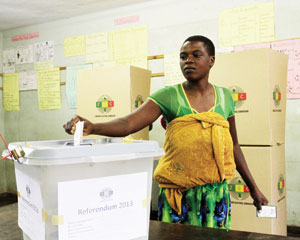
A group of young women were spotted in Harare admiring each other’s pinky fingers on Saturday after casting their votes in the referendum.
Report by Jennifer Dube
All the five said they voted “Yes” but when one asked “why”, it became apparent they all just approved a document whose contents they did not know.
“Well, I heard the draft says if a man dates a woman for three years, he is compelled to marry her,” one of them said. “Maybe this is our chance to get married.”
That became a face-saver as the conversation shifted to that “provision”, with each of the ladies giving her views on the merits and demerits of the constitution.
There was a consensus that implementing the “provision” may not be easy, as forcing a man to marry someone may prove difficult.
A 53-year-old Highlands house helper said she voted “Yes” because the draft constitution had the potential to end infidelity.
“I was told that the draft does not allow all these things that men do, being away from home for many days without informing his wife so I voted for it. maybe women can get some rest from these cheating men,” she said.
- Chamisa under fire over US$120K donation
- Mavhunga puts DeMbare into Chibuku quarterfinals
- Pension funds bet on Cabora Bassa oilfields
- Councils defy govt fire tender directive
Keep Reading
Wongai Zhangazha, a Zimbabwe Independent journalist who covered the referendum, is among those who feel many women voted blindly without appreciating the contents of the draft.
“From the interviews I had with some women who voted for the draft, it became clear that some were just following the directives of their political parties,” Zhangazha said. “The women could not identify any issues that could have made them vote for the draft.”
But Newsday reporter, Veneranda Langa, however felt some women were conversant of the draft’s contents.
“It is possible that some women might have voted blindly, especially those in the rural areas because publicity campaigns were centred in the cities,” Langa said. “But many in the cities knew what they were voting for as they were exposed to many publicity campaigns by women’s organisations and other civic groups.
“Political leaders like Vice-President Joice Mujuru and Deputy Prime Minister Thokozani Khupe were very active in some of these campaigns, making them more popular.”
Regional Integration and International Co-operation minister Priscilla Misihairabwi-Mushonga said women understood exactly what they voted for.
“It is the trend across the world that as long as someone does not have a good grasp of legal matters, they may find it difficult to understand the constitution,” she said. “Some Americans do not have a full understanding of their constitution despite it being praised as the best in the world.
She added: “I think Zimbabwean women understood exactly what they were voting for. They may not be able to articulate the clauses but they know that the draft is good for their socioeconomic and political empowerment.”
Draft charter: what’s in it for women?
A 2012 gender audit of the draft done by Claudia Flores for the United Nations Development Programme (UNDP) says the different provisions in the draft can benefit women and promote equality.
The draft attempts to promote women’s representation in the national assembly through several mechanism including an additional 60 seats being temporarily allocated to women (six from each province elected through proportional representation based on votes cast).
The additional seats expire after two terms of parliament regardless of whether women have achieved a percentage of seats in the permanent seats.
The draft also gives women a constitutional right to be free from violence which will provide important protection to women on gender-based violence and domestic violence and there is a right to make decisions about one’s own reproduction, bodily and psychological integrity and a right to informed consent in relation to medical experiments.
Women’s equitable access to land is promoted by the draft constitution which states that the principles of land distribution must be fair and equitable, taking into account gender balance.
Some of these rights are not clearly spelt out in the current constitution.










